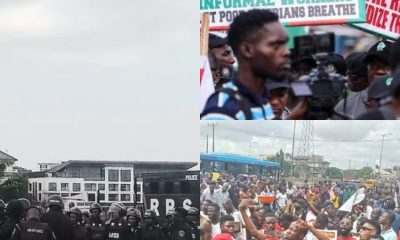News
Memory lane: How I Made Obasanjo Head Of State Against His Wish – TY Danjuna

Ex-Minister of Defense, General TY Danjuma, rtd, on memory lane on how he made General Olusegun Obasanjo Head of State after General Murtala Muhammed’s demise.
Read:
“Then, Murtala was killed. I think it is public knowledge that Obasanjo fled on the day Murtala Muhammed was killed. He remained in hiding until the coup was aborted and he reached out, first, to M.D Yusuf (Inspector-General of Police), who then called him and he came out of hiding, and joined us in Dodan Barracks. We discussed the funeral of Muhammed and made arrangement as to who would accompany his remains to Kano, so on and so forth.
At the end of the meeting, Obasanjo asked M.D Yusuf and I to stay with him in the chambers (Dodan Barracks). After everybody had left, Obasanjo told M.D Yusuf and I that what had happened had destroyed his faith in the loyalty of the Nigerian Army. That he had decided that after the funeral, he would retire, leave the Army and go home. But before that he would name me as the successor to Murtala. I told him that, that amounted to desertion and that he could not run away. He was number 2, number 1 had been killed in battle; he as number 2 would take over.
He said no, no, no; that he didn’t think he should stay; that he wanted to go. We argued that. In the end, Yusuf said, “look, let’s all sleep over this matter; tomorrow we will decide.” I said, “look, there’s no question of sleeping over it; the point now is we should be looking for who is going to take Obasanjo’s seat as number 2 because there is no way we are going to allow him to chicken out and leave at this time; we must all stay and face the future together.”
So, we left and I went home. By this time, we had called all the members of the Supreme Military Council to Lagos.
The following day, he (Obasanjo) started to talk in the same vein and I cut in. I said that Obasanjo could not leave; he had to stay and be the Head of State and we should be looking for the number 2 man. I had, over night, considered the consequences of what had happened and came to the conclusion that if we were not careful; we would end up with a religious conflict on our hands. Already, that evening – the evening that it became public knowledge that Murtala had been killed – Dimka had made a broadcast in which he said, “good tidings” among other things. He had imposed a curfew – from dawn to dusk (laugh) and said all sorts of things using the expression, “good tiding.”
Abubakar Gumi, in the North, said that the coup that killed Murtala was a Christian coup because of the utterances of the coup leader, who said, “good tidings” because it is an expression of Christians. Already, there was tension in the North. The governor of Kaduna State, an air force officer, Usman, had to contain him: that it had nothing to do with Christians, that it was a purely military affair.
I knew that if we were not careful, as time went on, we should be consumed by religious strife in the country. I decided that the new Chief of Staff must come from the North preferably, a Hausa/Fulani man. From my knowledge, I had two candidates – (Muhammadu) Buhari, who was really my number one candidate for that post and the late Shehu Yar’Adua. Shehu was not in the country; he was abroad as Minister of Transport. You would remember we had inherited a cement armada in the Lagos and Port Harcourt (ports) and his (Shehu’s) first assignment was to decongest the Lagos port and get rid of all the vessels that were clogging Nigerian waters, and attracting huge demurrages from our government. He (Shehu) was abroad attending to that problem when Dimka struck.
So, they were the two candidates. Buhari, at that time, and even today, is one of the most upright Army officers that the Nigerian Army has produced – very clean, a very strict officer. Unfortunately for him, he served under me for a short time in Port Harcourt and I observed that he was a very inflexible person. I reasoned that Buhari, any day, could be a first class Chief of Army Staff. Why waste him in a political post? Why shorten his career because if he became Chief of Staff, he would have to leave at the end of the tenure. Why waste him there?
Besides, I observed that he was too rigid; he was too inflexible to hold a political post. If you are in politics, you must be flexible; you must compromise from time to time. In politics, they call it pragmatism. But in the military, if you are pragmatic, it is regarded as a weakness. I said no, not Buhari. Shehu, I didn’t know him well except that I knew that, of all the officers of his rank, he was the most politicised. So, sending a politicised Army Officer to a political post, I thought, was a good thing. That was how I named Shehu the next Chief of Staff.
When we came to the Supreme Military Council and Obasanjo started singing the same tune that he had sung to me and M.D Yusuf the previous night, I said no, that was not the issue; he was the most senior person and he had to stay there. He had to stay in office. He made some feeble resistance but I think he had slept over our discussion and concluded that if we insisted, he would stay.
There were a few voices of dissent. The first came from the Chief of Air Staff, Isa Doko, who said that the problem we were facing was an Army problem and that the Army boys had confidence in me. That we had just crushed an attempted coup, and we should not put somebody there that the Army didn’t have confidence in. A few other officers supported him but I overruled them. And so, I imposed Obasanjo on my colleagues in the Supreme Military Council.”
—General TY Danjuma in an interview with THE GUARDIAN, February 17, 2008.
News
“How we imortalised Olunloyo before his death-Makinde
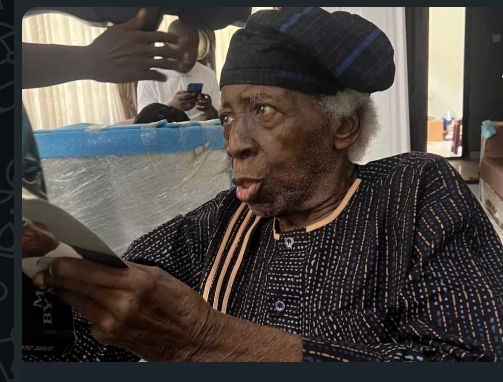
By Kayode Sanni-Arewa
Governor of Oyo State, Seyi Makinde has said he is happy that former governor of the State, Omololu Olunloyo was imortalised before his demise.
Makinde, in a condolence message by his media aide Sulaimon Olanrewaju on Sunday, said the country had lost a patriotic leader, an icon and one of its most cerebral former administrators with the politician’s demise.
The governor said it is sad that the late mathematical guru and administrator passed away before his 90th birthday.
“This death hits differently because I was looking forward to Baba’s 90th birthday, which would have come up on April 14. However, we have to submit to the will of God, who gives and takes lives as He wills.
“My joy is that our government immortalised and honoured Pa Olunloyo in his lifetime and he was present to witness it as we named the Ibadan Airport Road and the Leisure Park on the axis after him in recognition of his service to the state.
“May the Lord grant repose to his soul and give his family the fortitude to bear his demise,” Mr Makinde said.
The death of Mr Olunloyo was confirmed on Sunday morning through a statement by his family.
The deceased died just a few days before his 90th birthday, according to the statement.
News
Iran turns down Trump’s call for direct nuclear talks

Iran’s top diplomat has rejected direct negotiations with the United States as pointless, his office said Sunday, after US President Donald Trump said he preferred face-to-face talks over its nuclear programme.
Trump sent a letter to Iran’s supreme leader Ayatollah Ali Khamenei last month calling for negotiations but warning of military action if diplomacy failed.
On Thursday, the US president said he favoured “direct talks”, arguing they were “faster” and offered a better understanding than going through intermediaries.
But Iranian Foreign Minister Abbas Araghchi said direct talks made no sense with a country “that constantly threatens to resort to force in violation of the UN Charter and that expresses contradictory positions from its various officials”.
“We remain committed to diplomacy and are ready to try the path of indirect negotiations,” he was quoted as saying in a statement issued by his ministry.
Iran keeps itself prepared for all possible or probable events, and just as it is serious in diplomacy and negotiations, it will also be decisive and serious in defending its national interests and sovereignty.”
On Saturday, Iranian President Masoud Pezeshkian said his country was willing to engage in dialogue with the United States on an “equal footing”.
He also questioned Washington’s sincerity in calling for negotiations, saying “if you want negotiations, then what is the point of threatening?”
Iran and the United States have had no diplomatic relations since shortly after the 1979 Islamic Revolution with some regional countries like Oman playing a mediating role between the two sides.
Letter diplomacy
Trump’s letter was delivered to Iran via the United Arab Emirates, and Tehran responded at the end of March via the Sultanate of Oman.
On Sunday, the chief of staff of the Iranian armed forces, General Mohammad Bagheri, said Iran’s response stressed that “we seek peace in the region”.
“We are not the ones who start wars, but we will respond to any threat with all our might,” he said of the content of Iran’s response.
Western countries, led by the United States, have for decades accused Tehran of seeking to acquire nuclear weapons.
Iran rejects the allegation and maintains that its nuclear activities exist solely for civilian purposes.
In 2015, Iran reached a landmark deal with the permanent members of the UN Security Council, namely the United States, France, China, Russia, and the United Kingdom, as well as Germany, to limit its nuclear activities.
The 2015 agreement — known as the Joint Comprehensive Plan of Action — gave Iran sanctions relief in exchange for curbs on its nuclear programme to guarantee that Tehran could not develop a nuclear weapon.
In 2018, during Trump’s first term in office, the United States withdrew from the agreement and reinstated biting sanctions on Iran.
A year later, Iran began rolling back on its commitments under the agreement and accelerated its nuclear programme.
On Monday, Ali Larijani, a close adviser to Khamenei, warned that while Iran was not seeking nuclear weapons, it would “have no choice but to do so” in the event of an attack against it.
News
Nigerian Army ‘Destr0ys Over 70 Bandits Dens In Taraba, Wastes Three Terrorists’
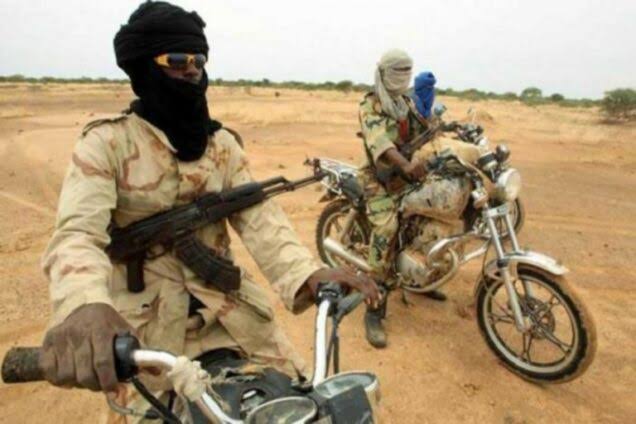
During the operation, three terrorists were reportedly eliminated, and security forces recovered firearms and logistical supplies.
The Nigerian Army says it has destroyed over 70 camps used by bandits in Taraba State, as part of a continued effort to combat terrorism in the region.
During the operation, three terrorists were reportedly eliminated, and security forces recovered firearms and logistical supplies.
SaharaReporters learnt that the military engaged the terrorists at a hideout in Achelle, situated within the Karim Lamido Local Government Area, as part of their ongoing efforts to dismantle the remaining elements of terrorist groups in the state.
Captain Oni Olubodunde, spokesperson for the 6 Brigade of the Nigerian Army in Jalingo, confirmed the operation, stating that its primary objective was to identify and neutralise dangerous criminals active in the area.
Olubodunde further reported that, in addition to eliminating the three terrorists, security personnel seized an AK-47 rifle, ammunition, and two motorcycles during the operation, which took place on April 5, 2025.
“In continuation of Operation Lafiya Jama’a, a military offensive to remove criminal elements from Taraba State, the brave troops of the 6 Brigade Nigerian Army and Sector 3 Operation Whirl Stroke (OPWS) successfully neutralised three bandits, destroyed several camps, and seized weapons and ammunition during a daring clearance operation conducted in the Karim Lamido Local Government Area on April 5, 2025,” said Olubodunde.
The operation targeted suspected bandit hideouts, beginning in Achelle, where troops carried out a thorough sweep before advancing to Chibi.
As forces reportedly approached Chibi, the bandits attempted to escape but were intercepted. In the ensuing clash, three bandits were eliminated, and multiple makeshift camps were destroyed. Security personnel also seized two motorcycles, an AK-47 magazine, and 13 rounds of 7.62mm special ammunition.
Furthermore, troops conducted extensive searches in the Dutsen Zaki and Achalle areas, where over 70 criminal camps have been dismantled in recent weeks.
According to Olubodunde, no signs of human activity were detected during this latest operation, underscoring the effectiveness of previous security efforts.
Brigadier General Kingsley Chidiebere Uwa, Commander of the 6 Brigade Nigerian Army, praised the troops for their dedication and strategic execution. He reassured the people of Taraba State that terrorists and criminals would find no refuge in the region.
General Uwa also urged residents to remain vigilant while going about their daily activities without fear. He emphasised the importance of maintaining law and order.
He encouraged the public to provide timely and credible information to security agencies, stressing that such cooperation is essential for ensuring the safety of local communities.
-
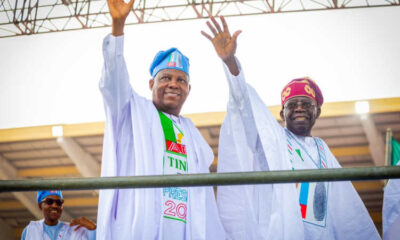
 Politics9 hours ago
Politics9 hours agoTinubu Gives Fani Kayode, Others New Appointments (See Full List)
-

 News9 hours ago
News9 hours agoDANGER! Ex-Soldier Abubakar Affan Vows to Kill VeryDarkMan ‘Like Deborah Samuel’
-

 News12 hours ago
News12 hours agoWhy NYSC maybe extended by FG- Minister
-
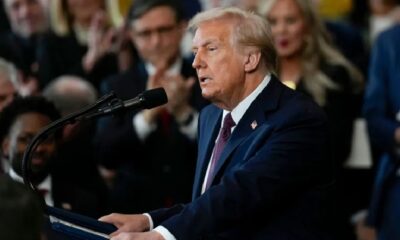
 News22 hours ago
News22 hours agoVOA Halts Operations In Nigeria, Others Over President Trump
-

 News12 hours ago
News12 hours agoIbas moves to rehabilitate damaged Rivers LG secretariats
-
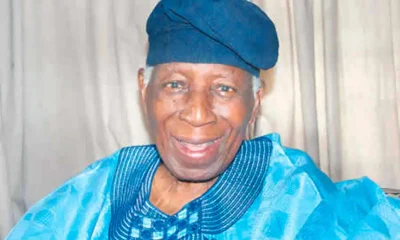
 News9 hours ago
News9 hours agoJust in: Ex-Oyo governor, Olunloyo is dead
-

 Economy12 hours ago
Economy12 hours agoCBN allocates $197.71m into FX market to support naira
-

 News23 hours ago
News23 hours agoPolice rescue 14 kidnapped passengers of Benue Links


